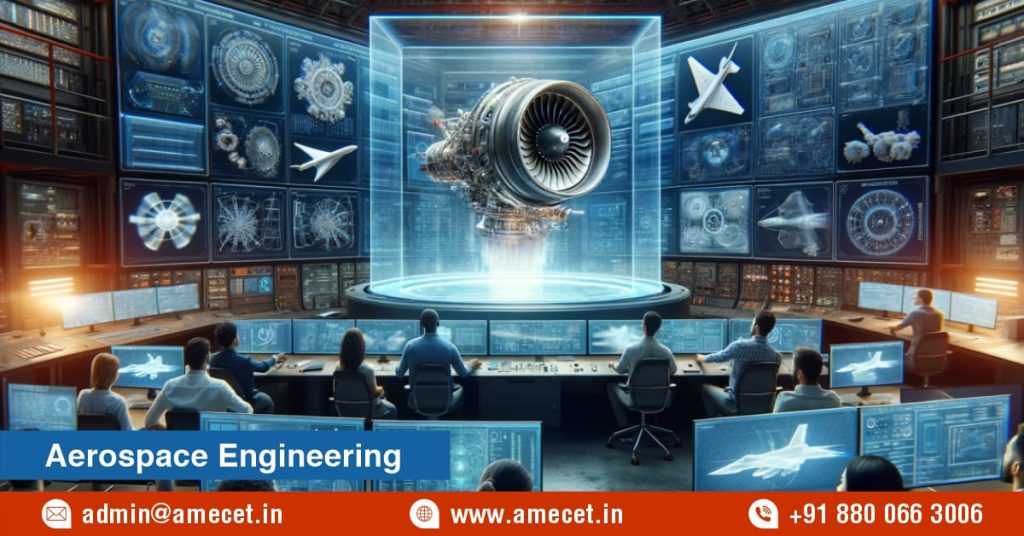What skills are essential for success in Aerospace Engineering?
Posted on : 18 January, 2024 2:14 pm
Aerospace Engineering
Aerospace engineering is the branch of engineering that deals with the design, development, and testing of aircraft, spacecraft, and missiles. Aerospace engineers are responsible for creating and improving the systems and technologies that make flight possible. They work on a wide range of projects, from small unmanned drones to large commercial airliners and interplanetary spacecraft.
Aerospace Engineering Course Eligibility
Course eligibility criteria are mandatory to fulfill for the aerospace engineering admission. The eligibility criterion is such as:-
- An Applicant must pass 10+2 with Physics, Chemistry, and Mathematics or Biology (PCM/PCB) or 3 years engineering diploma in any stream from any recognized Board/ University at the time of admission in any college/Institutes.
- Candidates can qualify the AME CET exam for admission and avail up-to 100% scholarship in India.
Skills required becoming Aerospace Engineering
To become an aerospace engineer, one typically needs to have a strong background in mathematics and science, as well as excellent analytical and problem-solving skills. Other important skills and qualities include:
Strong Analytical Skills:
- Aerospace engineers must analyze complex problems and develop solutions. Strong analytical skills help in understanding and solving intricate engineering challenges related to aerodynamics, structures, and propulsion.
Mathematical Proficiency:
- Aerospace engineering heavily relies on mathematics. A solid understanding of calculus, differential equations, linear algebra, and other mathematical concepts is essential for various aspects of aircraft and spacecraft design and analysis.
Problem-Solving Skills:
- The aerospace industry involves addressing unique and complex problems. Engineers must be adept at identifying, analyzing, and solving challenges that arise during the design, testing, and implementation phases of aerospace projects.
Technical Proficiency:
- Proficiency in using engineering software tools and programming languages is crucial. Engineers should be familiar with simulation tools, CAD software, and programming languages relevant to aerospace applications.
Understanding of Physics:
- A strong foundation in physics is essential for understanding the principles of flight, aerodynamics, thermodynamics, and propulsion systems. This knowledge is critical for designing and optimizing aerospace systems.
Teamwork and Communication:
- Aerospace engineering projects are collaborative efforts that involve multidisciplinary teams. Effective communication and teamwork skills are essential to convey ideas, collaborate with diverse professionals, and contribute to the success of a project.
Attention to Detail:
- Precision is vital in aerospace engineering. Engineers need to pay close attention to details during the design, manufacturing, and testing processes to ensure the safety and reliability of aerospace systems.
Creativity and Innovation:
- Aerospace engineers often work on cutting-edge technologies and face unique challenges. Creativity and the ability to think innovatively are crucial for designing new and efficient aerospace solutions.
Adaptability:
- The aerospace industry is dynamic, with evolving technologies and changing project requirements. Being adaptable to new tools, methodologies, and industry trends is essential for success in this field.
Project Management Skills:
- Aerospace projects often have tight schedules and budget constraints. Project management skills, including planning, organization, and time management, are crucial for delivering projects on time and within budget.
Ethical and Safety Awareness:
- Aerospace engineers must prioritize safety and adhere to ethical standards in their work. Understanding the implications of design decisions on safety and the environment is critical in the aerospace industry.
Continuous Learning:
- Aerospace engineering is a field that continually evolves. Engineers must have a mindset of continuous learning to stay updated on the latest technologies, industry standards, and advancements in aerospace engineering.
In conclusion, pursuing a career in aerospace engineering requires a combination of technical expertise, analytical thinking, and interpersonal skills. The eligibility criteria for an aerospace engineering course typically include a background in physics, chemistry, and mathematics. To excel in this field, individuals should possess a set of skills, including strong analytical abilities, mathematical proficiency, problem-solving skills, technical proficiency, and a deep understanding of physics.
Effective teamwork and communication are crucial for collaborative aerospace engineering projects, as is attention to detail to ensure precision in design and manufacturing processes. Creativity and innovation play a vital role in tackling cutting-edge technologies and addressing unique challenges in the aerospace industry. Adaptability to evolving technologies and project requirements is essential, along with project management skills to meet tight schedules and budget constraints.
In essence, a successful aerospace engineer combines technical proficiency with a range of soft skills to contribute to the design, development, and improvement of aircraft, spacecraft, and missile systems, ensuring safety, reliability, and innovation in the aerospace industry.

